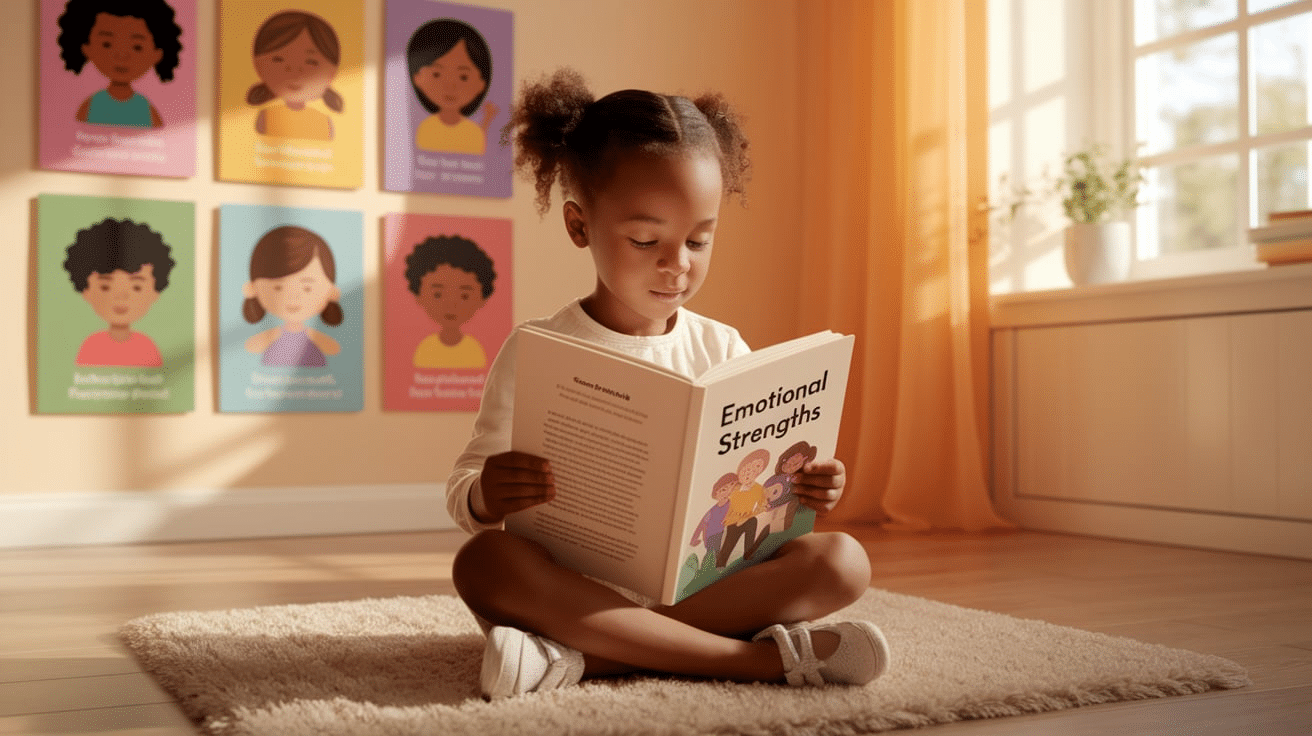Children feel emotions deeply. Parents often struggle to understand why kids burst into tears or throw tantrums over seemingly small issues. It’s hard to connect with them when they can’t explain what they’re feeling.
But what if parents could better grasp their child’s emotional world? Kids have amazing emotional abilities that often go unnoticed.
They sense things adults miss, feel things grown-ups have forgotten how to feel, and express themselves in ways many have learned to hold back.
This post will show how to spot and build on a child’s natural emotional strengths. Parents will learn simple ways to help their child grow emotionally strong, creating a bond that lasts.
What Are Emotional Strengths?
Emotional strengths help children understand, express, and manage their emotions in healthy ways, playing a crucial role in their overall development.
These strengths improve relationships by fostering effective communication and conflict resolution.
They also support academic success, as emotionally strong children can focus, manage stress, and stay motivated.
Additionally, emotional strengths promote better mental health by helping children cope with stress and anxiety, boosting their confidence and happiness.
They increase problem-solving skills, enabling children to think clearly and make smart decisions. Finally, emotional strengths build resilience, helping children bounce back from setbacks and adapt to new challenges.
Common Emotional Strengths Found in Children

Children have many emotional strengths that help them understand and handle their feelings, connect with others, and solve problems.
These strengths are important for their happiness, learning, and friendships. Here are some of the most common emotional strengths seen in children:
- Empathy: Children with empathy can understand and care about how others feel. They might comfort a friend who is sad or help someone who needs support.
- Resilience: Resilient children bounce back after setbacks or disappointments. If something goes wrong, they try again instead of giving up.
- Self-Regulation: This means being able to control emotions and actions, even when upset or excited. Children with this strength can calm themselves down and make good choices.
- Self-Awareness: Self-aware children recognize their own feelings and know what makes them happy, sad, or angry. They can talk about their emotions and ask for help when needed.
- Optimism: Optimistic children look on the bright side and expect good things to happen. They stay positive, even when things are tough.
- Curiosity: Curious children love to learn and explore. They ask questions, try new things, and want to understand the world around them.
- Creativity: Creative children use their imagination to solve problems, tell stories, or create art. They think of new ideas and enjoy expressing themselves.
- Social Skills: Children with strong social skills make friends easily, share with others, and work well in groups. They listen, communicate, and show respect to others.
These emotional strengths help children succeed at school, build strong friendships, and feel good about themselves.
Signs Your Child is Developing Strong Emotional Strengths
As children grow, they develop emotional strengths that help them navigate challenges, build relationships, and thrive in various aspects of life.
Naming Their Feelings
Children show growth when they use words for emotions. A child who says “I feel sad” instead of just crying has taken a big step. They are learning to put words to what’s going on inside them.
Self-Calming Skills
Children with growing emotional strength can calm themselves when upset. They might take deep breaths, hug a stuffed animal, or find a quiet corner. These self-calming tricks show they’re learning to handle big feelings.
Showing Empathy
When your child shares a toy or asks if someone is okay after falling down, they’re thinking about how others feel. This caring attitude comes from growing emotional skills.
Bouncing Back from Upsets
Children who can recover from sad or angry moments show good emotional health. They might cry or get mad, but then they can move on with their day without staying stuck in bad feelings.
Asking for Help
Seeking help when needed shows your child knows their limits. This awareness is an important part of emotional growth. It means they know when they can handle things alone and when they need support.
Look for these signs in your child. They may show up at different ages, but each one is a step toward strong emotional health.
How Parents Can Foster Emotional Strengths in Children

Parents play a key role in helping kids build strong feelings. They can start by talking about emotions often, using simple words like “happy,” “sad,” and “mad” in daily chats.
A quick “You look happy with your drawing” teaches kids to name what they feel.
When children share their feelings, parents should listen first without rushing to fix things. Not every problem needs a quick solution. Sometimes kids just need someone to hear them out.
Making a feelings chart with different faces can help younger children point to how they feel when words are hard to find.
Reading books about emotions turns story time into a chance to learn about feelings in a safe way.
Parents who stay calm during meltdowns teach more than words ever could. Taking deep breaths together shows children how to handle big emotions.
Praising emotional wins, like sharing toys or waiting turns, helps children see when they’re doing well. These small, daily actions help children grow emotional skills they’ll use for life.
Guiding Children’s Emotional Strengths: Strategies for School and Home

In the Classroom
Teachers can help students build emotional strengths by creating a supportive and respectful environment.
- Encouraging teamwork, active listening, and open communication helps children feel valued and understood. ‘
- Activities like group discussions, role-playing, and sharing feelings allow students to practice empathy and self-awareness.
- Positive feedback and celebrating small achievements also boost confidence and emotional growth.
What to do at Home
Parents and caregivers can nurture emotional strengths by listening carefully to their children and showing understanding.
- Talking about feelings openly helps kids recognize and manage their emotions.
- Setting routines and clear expectations gives children a sense of security. Encouraging children to solve problems and make choices on their own builds independence.
- Family activities, like reading stories about emotions or playing games together, can also teach important lessons about empathy and self-control.
When adults show love, patience, and encouragement, children feel supported and ready to handle challenges.
Common Challenges and How to Overcome Them
Even as children grow emotionally, they can face challenges. Here’s how to address some common ones:
1. Struggles with controlling emotions, leading to outbursts.
Solution: Teach coping strategies like deep breathing and taking breaks. Praise calm behavior to encourage self-regulation.
2. Becoming discouraged after failure.
Solution: Encourage a growth mindset by praising effort and helping them see mistakes as learning opportunities.
3. Difficulty understanding others’ feelings or making friends.
Solution: Practice role-playing and discuss emotions to improve empathy and social interactions.
4. Fear of trying new things or making mistakes.
Solution: Celebrate small successes and encourage them to set achievable goals. Focus on effort, not just outcomes.
5. Anxiety or stress leading to withdrawal.
Solution: Establish a calm routine, teach relaxation techniques, and encourage open communication about their feelings.
6. Acting without thinking or struggling to wait.
Solution: Encourage thinking before acting and practice patience through games. Reinforce self-control with positive feedback.
The Bottom Line
Recognizing a child’s emotional strengths is not just important, it’s essential. By paying attention to how children express their feelings, adults can create safe spaces for emotional growth.
When parents and caregivers spot these strengths early, they help build a foundation for lifelong emotional health.
The small moments of connection matter most: listening without judgment, accepting all feelings as valid, and showing children they’re understood.
So what’s next? Start by watching for your child’s unique emotional gifts today. Notice how they show empathy, share joy, or work through sadness.
Comment below with one emotional strength you’ve noticed in a child in your life.
















